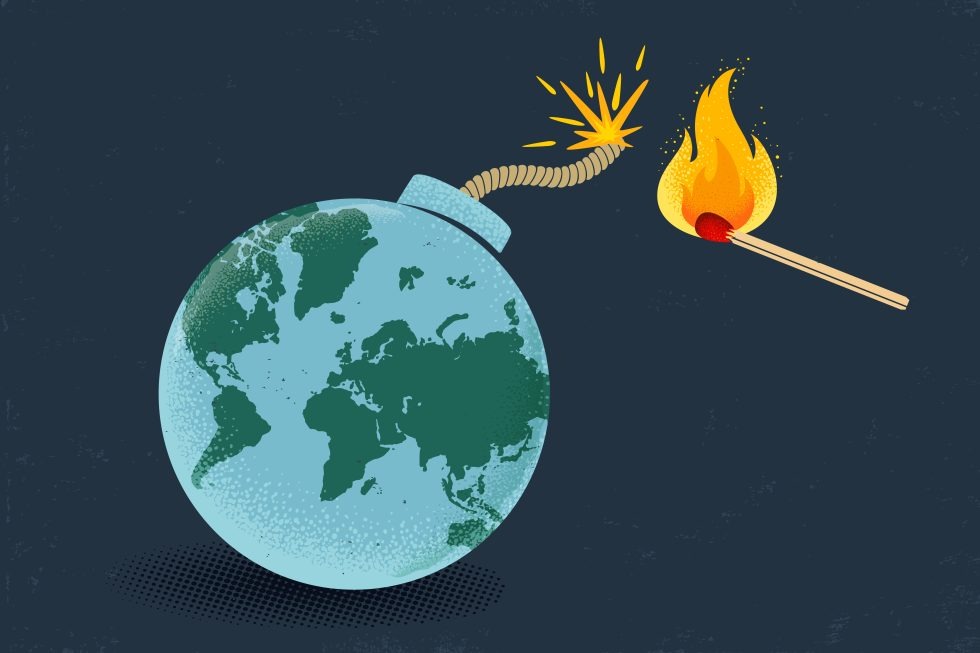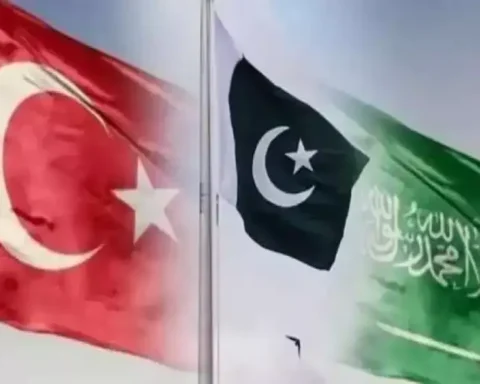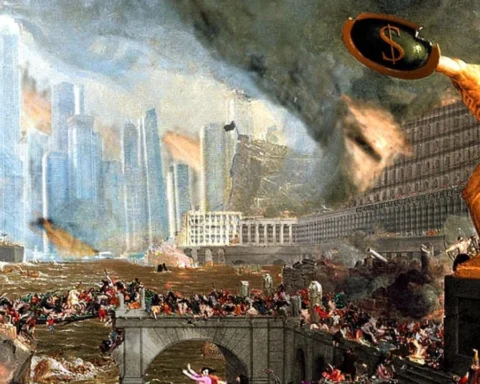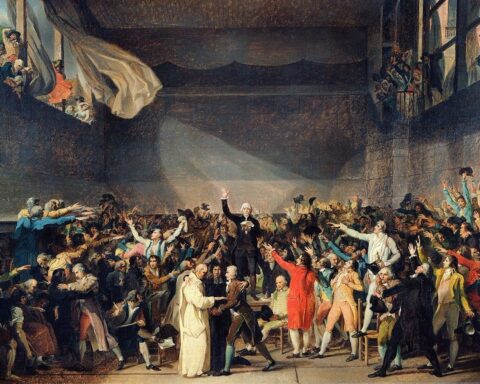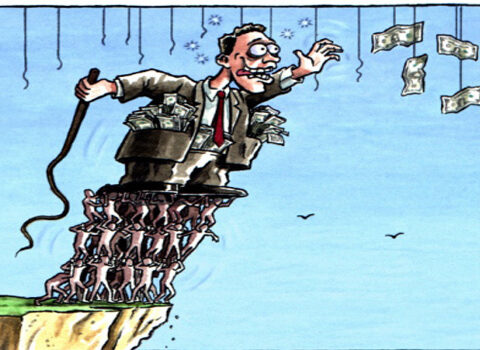Sometimes, when the electricity goes out in a city, everyone works together to maintain order, help the most vulnerable residents, and find ways of coping with the temporary disruption. Every so often, however, a blackout leads to anarchy: looting, violence, and all against all.
To many observers, the world is currently experiencing a blackout with little in the way of cooperation. Strong countries like Russia and Israel are invading their weaker neighbors. The United States under Donald Trump has initiated a trade war that is paralyzing the global economy. The climate emergency is only getting more severe, and international institutions like the UN seem incapable of addressing it.
The global rules of the road governing human rights, the protection of natural resources, and even sovereignty are eroding. Has the world passed a tipping point where violations have become so numerous that compliance has become a thing of the past?
Is anarchy the world’s future?
The current crisis affecting the world order comes down to a matter of perception. International affairs seem considerably less predictable today than, for instance, during the Cold War period. The bipolar order offered a semblance of stability, of a time when the European Community was able to coalesce, East Asian countries like South Korea and Japan could rapidly develop, and Third World countries could play the two superpowers off each other.
But the Cold War order was only superficially stable. It featured two separate rules of the road for the capitalist and the communist worlds, and these worlds clashed on a regular basis. War in Korea and Vietnam, genocide in Cambodia, famine in Biafra and Bangladesh, military coups throughout Latin America, Africa, and Asia: only the Global North enjoyed unprecedented stability and prosperity during this period.
The decades after the fall of the Berlin Wall in 1989 featured the consolidation of an international community built on the rule of law and the protection of human rights. But this new global order was very fragile, and its rules were often honored only in the breach.
This post-Cold War order, in which the United States acted more unilaterally, was even more unpredictable than what came before. Although the European Union expanded, U.S.-Russian relations experienced a brief détente, and China began its rapid economic growth, horrific violations continued: the genocides in Bosnia and Rwanda, the first Gulf War, the 9/11 attacks followed by the wars in Afghanistan and Iraq, the killing fields in Sudan, and devastating economic crises in Asia in 1997 and globally in 2008.
When today’s events are put into this larger context, the current trajectory does not seem substantially more anarchic. Most countries continue to adhere to global rules. They are still submitting cases for arbitration at the World Trade Organization and the International Court of Justice. The International Criminal Court continues to issue arrest warrants and, in the recent case of Rodrigo Duterte, to take well-known figures into custody. There is some cautious optimism that Brazil can reenergize climate talks this year, even without the participation of the United States.
Despite the continuing atrocities committed by Russia and Israel, other countries are not rushing to seize neighboring territory. India and Pakistan stepped away from the brink after a clash over Kashmir. China has not invaded Taiwan. Venezuela continues to advance claims against Guyana but hasn’t intervened militarily. Trump hasn’t followed through on his threats against Greenland, Panama, and Canada.
The fear of global anarchy focuses more on the future than the present. What if a large part of the world shifts to the far right, as in the years leading up to World War II? It’s certainly true that right-wing nationalists rule in the United States, Russia, Hungary, India, and El Salvador. Extremists threaten to take over in Germany and France, thereby moving the European Union away from liberal internationalism. The pink wave in Latin America—which has produced left-wing governments in Chile, Colombia, Brazil, and Mexico—looks like it might, in the wake of victories by Javier Milei in Argentina and Daniel Noboa in Ecuador, turn a nasty shade of brown.
But the evidence so far is that Trump is doing no favors to his right-wing counterparts in other countries. Thanks to fears of a home-grown Trump taking over, elections in Canada and Australia returned the center left to power. Trump’s attacks on Lula in Brazil have only boosted the leftist leader’s popularity. The left is now in charge in South Korea, the United Kingdom, Spain, and Sri Lanka.
There is some speculation that Trump is nudging the world toward one classic form of world order, namely the kind of spheres of influence that prevailed during much of the imperial era of the nineteenth century. In this updated version, the United States focuses on the Americas, China retains primary influence over East and Southeast Asia, and Russia controls the post-Soviet space, while European influence is restricted to its own limited chunk of Eurasia plus parts of Africa.
Such theories look plausible on paper, but the reality is considerably messier. The United States, under Trump, is still acting all over the world—bombing Iran, supplying a new weapons package to Ukraine, and spending huge sums of money on the military to confront China. China, meanwhile, remains committed to its Belt and Road initiative, which involves investing in infrastructure development and mining projects all over the world. The European Union is still pushing for an expansion of its membership into the post-Soviet space, including both Ukraine and Moldova.
Then there’s the notion that the BRICS represent a new kind of global force that is pushing back against Western imperialism. Although Russia is a primary mover of the BRICS coalition, it has not succeeded in turning the organization into an anti-Western entity. The other members, especially China and India, want an open economic order. The organization as a whole is comfortable working within the IMF and World Bank system.
To sum up, the current period is no more chaotic than earlier periods. The United States, under Trump, has exited a number of international agreements and institutions, like the Paris climate accord and the UN Human Rights Council, but there hasn’t been a rush to the exits to follow Trump. A future of Trump acolytes ruling all over the world is not inevitable or even likely. Rival global orders in the form of spheres of influence or the rise of anti-Western bloc have not materialized. For the most part, the global rules of the road still hold, and “mere anarchy” has not been “loosed upon the world,” as Yeats described the period immediately after World War I.
Does that mean that the world order will continue as is, with occasional disruptions and non-compliance?
It is always a mistake to assume that the present will not change, for change is a constant in world history. The climate crisis is the biggest variable. It’s an opportunity for some leaders to promote the politics of fear, of a war of all against all. That’s certainly one of the choices that a looming blackout offers.
But as writer Rebecca Solnit has persuasively argued, the more likely public response to disasters both current and impending—Hurricane Katrina in New Orleans, the COVID pandemic, rising ocean waters—has been to cooperate and find novel, even liberating, solutions. Soon her theory will be put to a test on a global level. Let’s hope that the Trumps of this world are wrong, and she is right.
* John Feffer, author and director of Foreign Policy in Focus at the Institute for Policy Studies
Source: https://english.hani.co.kr/arti/english_edition/english_editorials/1209116.html

